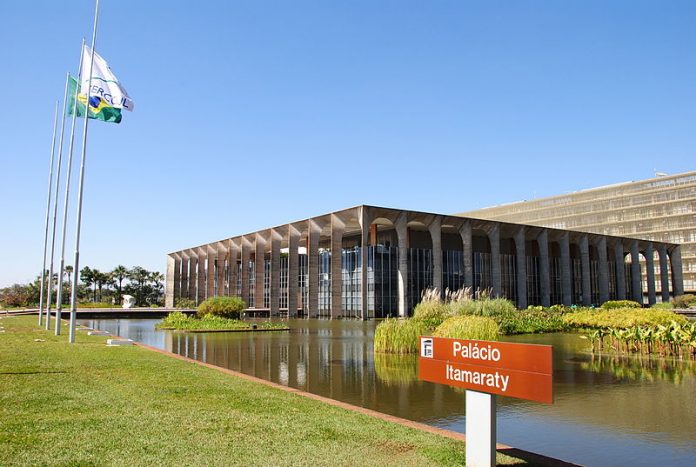There is a broad consensus among pundits, experts and strategic thinkers that the international order is in transition, if not in disarray, due to shifts in the international distribution of power, the rise of emerging countries, and the revival of geopolitics. The order is also put into question by the feeling of malaise in certain circles regarding globalization, giving rise to populism and protectionism. All these elements compound a new and complex reality that tests old analytical frameworks and demand a renewed effort to grasp the alternatives available to ensure stability and prosperity in the long-run.
For a large emerging country like Brazil, it is fair to admit that the current international landscape offers both risks and opportunities. Brazil has been a longstanding advocate for multilateral solutions to our pressing regional and global problems: open trade, financial crises, promotion of human rights and democracy, peace and security, disarmament, climate change, cybersecurity, fight against transnational crime and terrorism, humanitarian assistance, among others. If the rules-based international order is in crisis, Brazil’s international standing suffers accordingly, given our unwavering commitment to multilateralism and our traditional attachment to diplomacy as the preferred method to solve disputes and prevent conflicts.
The flip side is the evidence that the international order badly needs reforming, a point Brazil has consistently made. Actually, part of the inefficiencies and shortcomings of different organizations and regimes stem from calcified decision-making structures. The current crisis could be an opportunity to reform and overhaul multilateral institutions, in a manner consistent with the new realities of political power and economic clout. Institutions such as the UN and its Security Council are poised to undergo major reform, which is the best way – the only way – to ensure greater legitimacy and efficiency for their actions. Functioning multilateral institutions are also the best antidote against the temptations of unilateralism, which risk creating the environment for a parallel order to flourish, one deprived of the values and principles that have underpinned the postwar international liberal order.
In this world whose direction is uncertain, a deeper diagnosis of the international landscape is in great demand. Today, maybe more than ever, we need to enhance our strategic thinking to be able to implement effective and consequential foreign policies. This is the main reason behind the decision we took at Itamaraty (the Brazilian Foreign Ministry) to summon a task force to come up with a pioneer strategic planning system. It is important to ensure the country’s diplomacy is well-equipped to anticipate and prepare for the current and future challenges. The idea was to draw on the experience of other foreign services, on the best practices and lessons learned from various government agencies in Brazil and abroad as well as the private sector, not to mention the state of the art academic literature on public administration and strategic thinking.
The rationale behind the initiative is based on two main assumptions. The first is that, although Itamaraty already relies on a strong planning and analysis capacity, its bureaucratic machinery – much like other foreign ministries – has visibly swollen up, a phenomenon that coupled with the increased specificity and fragmentation of international issues makes the task of developing a comprehensive vision and monitoring of activities ever more complex. It is crucial that planning activities reflect this reality by ushering in unity of purpose, allowing for the anticipation of trends and risks in an uncertain international landscape and embedding a results-oriented approach into the Ministry’s modus operandi.
The second one is the inclination of oversight agencies to not only demand the definition of clear-cut goals and targets for public policies but also that government agencies demonstrate their efficacy and efficiency in a way to ensure the best use of taxpayers’ money. Foreign ministries around the globe face the same challenge of being transparent in the allocation of resources and in the definition of their strategic goals and priorities, without losing sight of the special nature of diplomacy.
The greatest challenge when it comes to strategic planning is precisely to measure the efficacy of its actions and activities. The efficacy of diplomacy is not measured in the same manner that one measures the efficiency of a vaccination campaign (e.g. number of immunized children). It’s also not possible to quantify the success of a foreign policy initiative with indicators such as the length of paved roads or the number of dredged rivers in a given year.
The efficacy of diplomacy requires, for the most part, long-term strategies and the use of qualitative (rather than merely quantitative) indicators. As an example, it took the Brazilian government roughly ten years to open up the US market for our fresh beef exports. But that doesn’t mean that we had been sorrowfully inefficient in the previous nine years. As a matter of fact, without the patience and the due diligence to build a case, resorting to all sorts of negotiation techniques and putting together numerous export promotion events in the course of the nine previous years, we would certainly not have succeeded in its tenth.
Planning in foreign affairs requires a sui generis approach, one that is adapted to a kind of public policy whose measure of success is seldom obvious. At times, a diplomatic triumph might be measured against the absence – or failure – of a foreign government’s decision (or that resulting from an international organization), which, had it not been averted, might have affected negatively our interests. It may also be expressed in the avoidance of a conflict that never actually started, but the mere publicization of the behind-the-scenes good offices might cause enormous damage. It is difficult to measure the degree of influence on decision-making processes in foreign countries or in international organizations, but we know diplomacy requires opening up channels of communication, strengthening relationships, and having access to key actors.
Being aware of how unique diplomacy is among other public policies does not cancel out the need to implement policy planning strategies, but advises the avoidance of more traditional formulae. Bearing that in mind, I determined the completion by the end of the year of a pilot version of the “system of strategic planning for Brazil’s foreign affairs” (SISPREX, in its acronym in Portuguese).
The system’s basic outline comprises: a) diagnosis of the international environment with a view to recognizing the main global and regional trends and their impact on Brazil’s foreign policy; b) a collective effort to be put together by Itamaraty’s sub-units to define the strategic objectives that will make up, in the near future, a government four-year strategic plan; and c) preparation of annual working plans containing specific goals and activities, followed by the corresponding budget estimates.
By resorting to the most modern techniques available, this integrated platform will be designed to ensure coherence among its three pillars, based on an internal governance structure charged with streamlining methodologies, providing recommendations and inputs, suggesting indicators, and updating the basic documents whenever necessary, which might result from shifting domestic political priorities or in reaction to unforeseen international events. It is meant to be a flexible system, with the ability to adapt to changes in both the domestic and the international environment.
It will be henceforth possible to take advantage of the ability to innovate and create of the younger cohorts in the Foreign Service, who will be called upon to chime in throughout the process of collective internal reflection. At the same time, it will be expected from the Foreign Ministry’s top brass to validate each one of the phases, bringing about clearer (and more deeply thought-through) guidelines and instructions. By combining the energy and creativity of the new generations with the experience of the higher-ranking officials, the system will facilitate internal debate and engage all Foreign Service members in the pursuit of the desired results. As importantly, this integrated system will facilitate monitoring activities, efficiency assessment, optimal allocation of resources, and sharing of best practices.
SISPREX will quickly turn into a practical link between Itamaraty and the rest of Brazilian society. It contains in its DNA the seeds of dialogue and transparency, which, by the way, should be the case when it comes to a Foreign Service in tune with our times. In the phase of diagnosis of global trends as much as in the phase of definition of Brazilian foreign policy’s strategic goals, close consultation with academia, experts, and other living forces of society will be critical. The documents resulting from the planning exercise (of non-confidential nature) will be equally valuable instruments of public diplomacy as they will no-doubt show clearly the importance of diplomacy to the whole of society and its key contribution for stronger, more prosperous and influential country.
In the 21st century, the specialization of foreign services seems to be an inevitable tendency, as diplomatic bureaucracies adapt to embracing a multitude of issues, technical dossiers, and intricate networks of multi-level international decision-making processes. The main risk is to get lost in the midst of such kaleidoscope. It is important to be able to muster our manpower to deal with each area of negotiation with the best available toolkit, but we should not look at the tree while losing sight of the forest. It is essential to keep a sense of direction by improving our strategic planning and introducing the crucial elements of internal debate and external dialogue into the equation, thus avoiding the pitfalls of groupthink and at the same time preserving the capability of acting as one.
The new strategic planning system is part of a larger effort of providing our diplomacy with the instruments commensurate with Brazil’s dimensions, its global outreach, and the wide range of its interests. It also reflects a foreign policy that does not shy away from taking up new responsibilities and sharpens its analytical lenses to respond adequately to an international order in constant flux. Brazil will continue to play an important role in its region and globally, but in order to navigate the 21st century’s largely unchartered waters, it must rely on the compass provided by an enhanced strategic planning system, aiming at the best combination of ends and means, which will also ensure the best mix of strategic thought and effective action.
We are in the business of shoring up the international liberal order. The success of this enterprise requires political will and good faith, but unfortunately, these are not sufficient conditions. It also depends on our ability to anticipate risks and draw scenarios for the future, constantly matching our ends with the means available. In a world of increased complexity, this certainly is a task of humongous proportions, but also an unavoidable one for any country that wishes to shape the international order in accordance with its interests and values. Brazil has no alternative but to prepare itself for the diplomatic, economic and political struggles of our time. To this end, a state-of-the-art strategic planning platform is not only useful but also indispensable.
The views and opinions expressed in this article are those of the author and do not necessarily reflect the official policy or position of any agency of the Brazilian government.

Director of Policy Planning at the Brazilian Foreign Ministry


